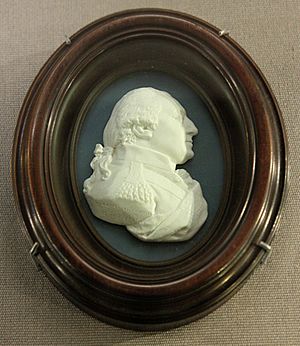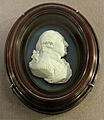Archibald Campbell Fraser of Lovat facts for kids
Archibald Campbell Fraser of Lovat (born August 16, 1736 – died December 8, 1815) was an important figure in Scottish history. He served as a British consul in places like Tripoli and Algiers. Later, he became a colonel in the local militia in Inverness. When his brother, Simon Fraser of Lovat, passed away in 1782, Archibald became the 20th leader, or MacShimidh, of Clan Fraser of Lovat. He also served in the House of Commons, which is part of the British Parliament, from 1782 to 1784.
Contents
Growing Up
Archibald Campbell Fraser was the son of Simon Fraser, 11th Lord Lovat. His mother was Primrose Campbell, who was the sister of the future 4th Duke of Argyll. Archibald was named after the 1st Duke of Argyll, who was a supporter of his father. This marriage showed the strong connection between the Fraser and Campbell clans.
There was a big age difference between Archibald's parents. His mother was 23, and his father was 56 and had been married twice before. Their marriage was not happy. In 1738, his mother left to live in Edinburgh, leaving Archibald with his father.
Archibald was attending school in the village of Petty when the famous Battle of Culloden happened nearby. He and his school friends watched the battle. He saw many Fraser clansmen fighting and witnessed how many of them were lost.
His father, Lord Lovat, later faced serious consequences and was executed in 1747. His title was taken away. Archibald's half-brother, Simon, Master of Lovat, was held in Edinburgh Castle for a year. However, he was fully pardoned in 1750. Archibald's mother sent him to Glasgow for his education. He attended Glasgow University from 1750 to 1752.
Early Adult Life
Not much is known about Archibald's early adult years. Some stories say he used the name Fitzsimon and was known in the world of sports. It is also suggested that he served in the Portuguese military. His official parliamentary records state he was a merchant.
What we do know is that he received a small amount of money each year from the Lovat estate. This estate had been taken by the government. From 1764 to 1766, he was the British Consul in Tripoli. Then, from 1767 to 1776, he was the Consul in Algiers.
By 1778, he was back in London. He joined the Highland Society of London. This group was created to help the Scottish Highlands. Their goals included ending the ban on wearing Highland dress, promoting the Gaelic language, and helping Highlanders in need. His half-brother Simon was a founder and president of this group. Archibald also became a Fellow of the Royal Society in the same year.
The Lovat estates were given back to Simon in 1774, but not the title. When Simon passed away without children in 1782, Archibald became the 20th MacShimidh. However, because Simon had debts, the estates were managed by trustees until all debts were paid.
Political Role
Archibald also took over his brother's seat in the House of Commons for Inverness-shire. He was elected without opposition in a special election on March 28, 1782. He held this position for two years. During this time, his speeches were mostly about money matters and Scottish issues.
In his first speech on June 17, 1782, he supported a motion to cancel the Dress Act 1746. This law was passed in 1746 to control the Highlands. It made it illegal to wear tartan or kilts in Scotland. The Act was successfully cancelled later in 1782.
In 1784, he was part of a group called the St. Alban's Tavern group. They tried to bring together two important political leaders, Fox and Pitt. Archibald did not run for re-election in the 1784 British general election.
Military Role
While his half-brother Simon became a high-ranking general, Archibald's military career was closer to home. He was made a colonel of the 1st Inverness-shire local militia. This was a type of military reserve force based in Inverness. After this, he was known as Colonel Fraser.
In 1794, during the French Revolutionary Wars, there were fears of invasion. Fraser was asked to form a Fraser Fencibles Regiment. This was a type of home guard. It was ready in the spring of 1795. Many of the soldiers were named Fraser and came from the old clan lands. The uniform was the usual Highland dress with a belted plaid and kilt of Fraser tartan.
Archibald was considered too old to lead the regiment himself. So, James Fraser of Belladrum was appointed colonel. The regiment was soon sent to Ireland in August 1795. In 1797, Archibald's son, John Simon Frederick Fraser, became the colonel of the regiment. The next year, it helped to stop the Irish Rebellion of 1798.
Other Contributions
- Boleskine House was built in the 1760s by Colonel Archibald Fraser. It started as a hunting lodge and was expanded by the Fraser family until about 1830.
- Fraser wrote a book called Annals of … the Patriots of the Family of Fraser, Frizell, Simson, or FitzSimon. It was published in 1795 and reprinted in 1805.
- He was one of the trustees of the Inverness bank.
- In 1807, Fraser became the president of a new group. This group was called the Northern Association of Gentleman Farmers and Breeders of Sheep.
Family Life
In 1763, Archibald married Jane Fraser. They had five sons together. Sadly, all of his sons passed away before him.
- John Simon Frederick Fraser (1765–1803) was the oldest son. He was a lieutenant-colonel in the Fraser Fencibles. He also served in parliament for Inverness-shire from 1796 to 1802. He passed away in Lisbon without marrying. He had one child outside of marriage, Archibald Thomas Frederick Fraser.
- Archibald Fraser was born in Edinburgh and passed away in 1792.
- Henry Emo Fraser was born in Algiers when his father was the Consul General. He passed away in August 1782.
- George Fraser passed away as a baby in 1781.
- William Henry passed away in February 1801.
Personality
Archibald could be described as an unusual person. Some historians said he was "nervous and excitable." He seemed to easily imagine problems and rebellions. Another historian noted that he was "very strict on some of his tenants." He also seemed to enjoy promoting himself. He placed a memorial to himself in the family burial place at Wardlaw that praised his own achievements. A description written 30 years after his death said he "sank into habits of over-conviviality." This means he drank too much, which harmed his good reputation.
Who Came Next
Fraser passed away on December 8, 1815. Since he was the last male in his direct family line, the title of Lovat went to Thomas Fraser of Strichen. A legal dispute about who should inherit the title started. It was between Thomas Alexander Fraser and Archibald Thomas Frederick Fraser (the son of Archibald's son, Simon, born outside of marriage). In 1826, a committee from the House of Lords interviewed people in Inverness-shire. They wanted to find out who was related by blood to Simon Fraser, 11th Lord Lovat.
How Fraser Was Shown
The picture at the top of this page appears in different forms and with different names. It might be Archibald Campbell Fraser, or it might be his half-brother Simon. This same profile exists as:
- A relief sculpture of Archibald Fraser. It is owned by the Harvard Art Museum and is from 1795. The museum has confirmed its authenticity.
- A color painting, showing either Simon Fraser or Archibald Fraser. It is dated between 1800 and 1830. It is owned by the New Brunswick Museum and is on loan to the McCord Museum in Montreal.
- A black and white sketch named Simon Fraser. It is in a book from 1900 called 'An historical account of the settlements of Scotch Highlanders in America'. This sketch might be from the relief sculpture but wrongly named.
There is also a different portrait at the National Library of Scotland that is supposedly of Archibald Fraser. However, the name 'Simon Fraser of Lovat, Brigadier General' is written below it. This is different from the name given by the library.
Images for kids
External Sources
- "Fraser, Archibald Campbell (1736-1815), of Lovat, Inverness" in History of Parliament online
| Parliament of Great Britain (1707–1800) | ||
|---|---|---|
| Preceded by Simon Fraser |
Member of Parliament for Inverness-shire 1782–1784 |
Succeeded by Lord William Gordon |
| Honorary titles
|
||
| Preceded by Simon Fraser |
MacShimidh 1782–1815 |
Succeeded by Thomas Alexander Fraser |
 | Selma Burke |
 | Pauline Powell Burns |
 | Frederick J. Brown |
 | Robert Blackburn |



